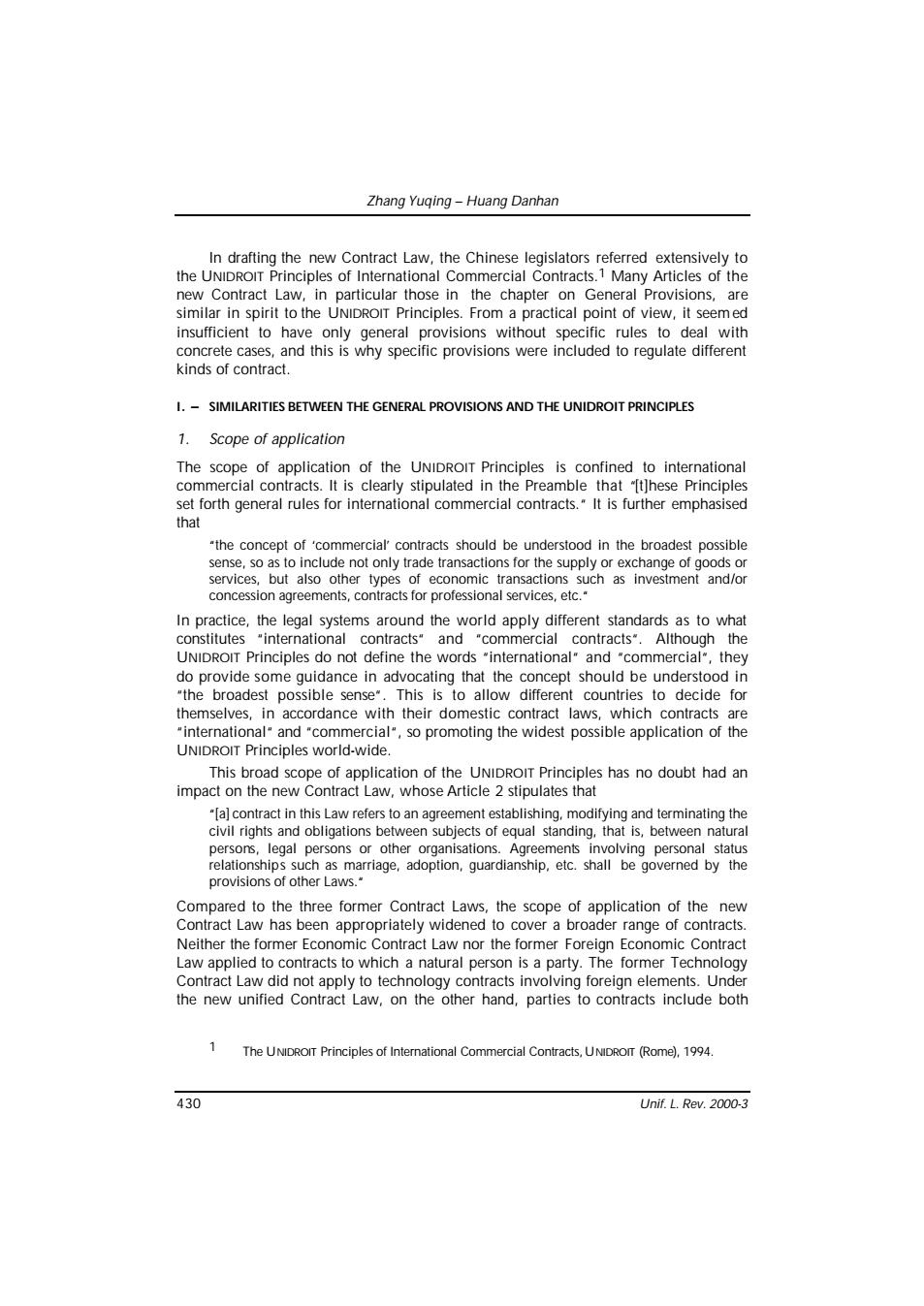正在加载图片...

Zhang Yuging-Huang Danhan In drafting the new Contract Law,the Chinese legislators referred extensively to the UNIDROIT Principles of International Commercial Contracts.1 Many Articles of the new Contract Law,in particular those in the chapter on General Provisions,are similar in spirit to the UNIDROIT Principles.From a practical point of view,it seem ed insufficient to have only general provisions without specific rules to deal with concrete cases,and this is why specific provisions were included to regulate different kinds of contract. I.-SIMILARITIES BETWEEN THE GENERAL PROVISIONS AND THE UNIDROIT PRINCIPLES 1. Scope of application The scope of application of the UNIDROIT Principles is confined to international commercial contracts.It is clearly stipulated in the Preamble that "[t]hese Principles set forth general rules for international commercial contracts."It is further emphasised that "the concept of 'commercial'contracts should be understood in the broadest possible sense,so as to include not only trade transactions for the supply or exchange of goods or services,but also other types of economic transactions such as investment and/or concession agreements,contracts for professional services,etc." In practice,the legal systems around the world apply different standards as to what constitutes "international contracts"and "commercial contracts".Although the UNIDROIT Principles do not define the words "international"and "commercial",they do provide some quidance in advocating that the concept should be understood in "the broadest possible sense".This is to allow different countries to decide for themselves,in accordance with their domestic contract laws,which contracts are "international"and "commercial",so promoting the widest possible application of the UNIDROIT Principles world-wide. This broad scope of application of the UNIDROIT Principles has no doubt had an impact on the new Contract Law,whose Article 2 stipulates that "[a]contract in this Law refers to an agreement establishing,modifying and terminating the civil rights and obligations between subjects of equal standing,that is,between natural persons,legal persons or other organisations.Agreements involving personal status relationships such as marriage,adoption,guardianship,etc.shall be governed by the provisions of other Laws. Compared to the three former Contract Laws,the scope of application of the new Contract Law has been appropriately widened to cover a broader range of contracts. Neither the former Economic Contract Law nor the former Foreign Economic Contract Law applied to contracts to which a natural person is a party.The former Technology Contract Law did not apply to technology contracts involving foreign elements.Under the new unified Contract Law,on the other hand,parties to contracts include both 1 The UNIDROIT Principles of International Commercial Contracts,UNIDROIT (Rome),1994. 430 Unif.L.Rev.2000-3Zhang Yuqing – Huang Danhan 430 Unif. L. Rev. 2000-3 In drafting the new Contract Law, the Chinese legislators referred extensively to the UNIDROIT Principles of International Commercial Contracts.1 Many Articles of the new Contract Law, in particular those in the chapter on General Provisions, are similar in spirit to the UNIDROIT Principles. From a practical point of view, it seem ed insufficient to have only general provisions without specific rules to deal with concrete cases, and this is why specific provisions were included to regulate different kinds of contract. I. – SIMILARITIES BETWEEN THE GENERAL PROVISIONS AND THE UNIDROIT PRINCIPLES 1. Scope of application The scope of application of the UNIDROIT Principles is confined to international commercial contracts. It is clearly stipulated in the Preamble that “[t]hese Principles set forth general rules for international commercial contracts.“ It is further emphasised that “the concept of ‘commercial’ contracts should be understood in the broadest possible sense, so as to include not only trade transactions for the supply or exchange of goods or services, but also other types of economic transactions such as investment and/or concession agreements, contracts for professional services, etc.“ In practice, the legal systems around the world apply different standards as to what constitutes “international contracts“ and “commercial contracts“. Although the UNIDROIT Principles do not define the words “international“ and “commercial“, they do provide some guidance in advocating that the concept should be understood in “the broadest possible sense“. This is to allow different countries to decide for themselves, in accordance with their domestic contract laws, which contracts are “international“ and “commercial“, so promoting the widest possible application of the UNIDROIT Principles world-wide. This broad scope of application of the UNIDROIT Principles has no doubt had an impact on the new Contract Law, whose Article 2 stipulates that “[a] contract in this Law refers to an agreement establishing, modifying and terminating the civil rights and obligations between subjects of equal standing, that is, between natural persons, legal persons or other organisations. Agreements involving personal status relationships such as marriage, adoption, guardianship, etc. shall be governed by the provisions of other Laws.“ Compared to the three former Contract Laws, the scope of application of the new Contract Law has been appropriately widened to cover a broader range of contracts. Neither the former Economic Contract Law nor the former Foreign Economic Contract Law applied to contracts to which a natural person is a party. The former Technology Contract Law did not apply to technology contracts involving foreign elements. Under the new unified Contract Law, on the other hand, parties to contracts include both 1 The UNIDROIT Principles of International Commercial Contracts, UNIDROIT (Rome), 1994